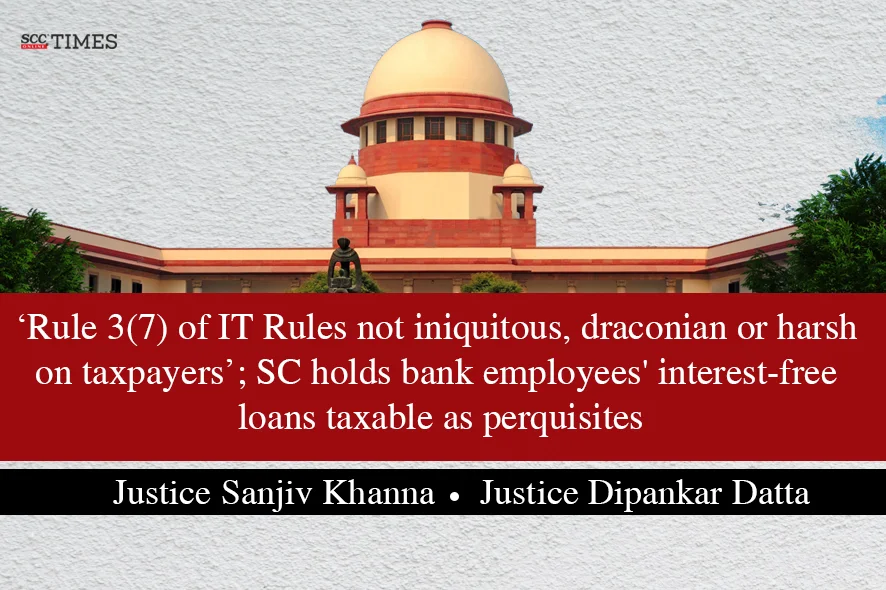Supreme Court: In a judgment filed by staff unions and officers’ associations of various banks, against the judgments passed by the Madras High Court and the Madhya Pradesh High Court ,wherein the Courts dismissed their writ petitions, challenging the vires of Section 17(2)(viii) of the Income Tax Act, 1961 or Rule 3(7)(i) of the Income Tax Rules, 1962, the division bench of Sanjiv Khanna* and Dipankar Datta , JJ. has held that Section 17(2)(viii) does not lead to an excessive delegation of the ‘essential legislative function’, and the Rule 3(7) is intra vires Article 14 of the Constitution of India.
Section 17(2)(viii) and Rule 3(7)(i) are challenged on the grounds of excessive and unguided delegation of essential legislative function to the Central Board of Direct Taxes. Rule 3(7)(i) is also challenged as arbitrary and violative of Article 14 of the Constitution insofar as it treats the Prime Lending Rate (‘PLR’) of SBI as the benchmark instead of the actual interest rate charged by the bank from a customer on a loan.
The Court noted that the in terms of the power conferred under Section 17(2)(viii), CBDT has enacted Rule 3(7)(i) of the Rules.
The Court noted that the effect of the rule is twofold. First, the value of interest-free or concessional loans is to be treated as ‘other fringe benefit or amenity’ for the purpose of Section 17(2)(viii) and, therefore, taxable as a ‘perquisite’. Secondly, it prescribes the valuation method of the interest-free/concessional loan for taxation purposes.
The Court said that while enacting laws, the legislature can and does delineate the meaning of terms through explicit definitions. Specific meanings are assigned for precision, to distinguish words/expressions from loose or popular meanings, expand or restrict the scope of words or expressions, or to designate ‘terms of art’, that is, words or phrases with specialized meanings.
The Court said that Section 17(2(viii) is a residuary clause, enacted to provide flexibility. Since it is enacted as an enabling catch-within-domain provision, the residuary clause is not iron-cast and exacting. A more pragmatic and commonsensical approach can be adopted by locating the prevalent meaning of ‘perquisites’ in common parlance and commercial usage.
The Court remarked that the expression ‘perquisite’ is well-understood by a common person who is conversant with the subject matter of a taxing statute.
The Bench stated that ‘perquisite’ is a fringe benefit attached to the post held by the employee unlike ‘profit in lieu of salary’, which is a reward or recompense for past or future service. It is incidental to employment and in excess of or in addition to the salary. It is an advantage or benefit given because of employment, which otherwise would not be available. Thus, the employer’s grant of interest-free loans or loans at a concessional rate will certainly qualify as a ‘fringe benefit’ and ‘perquisite’, as understood through its natural usage in common parlance.
(I) Does Section 17(2)(viii) and/or Rule 3(7)(i) lead to a delegation of the ‘essential legislative function’ to the CBDT?
The Court took note of Municipal Corpn. of Delhi v. Birla Cotton Spg. and Wvg. Mills, (1968) SCC OnLine SC 13, wherein it was held that that the legislature must retain with itself the essential legislative function. ‘Essential legislative function’ means the determination of the legislative policy and its formulation as a binding rule of conduct. Therefore, once the legislature declares the legislative policy and lays down the standard through legislation, it can leave the remainder of the task to subordinate legislation the Court opined that the subordinate authority’s power under Section 17(2)(viii), to prescribe ‘any other fringe benefit or amenity’ as perquisite is not boundless. It is demarcated by the language of Section 17 of the Act. Anything made taxable by the rule-making authority under Section 17(2)(viii) should be a ‘perquisite’ in the form of ‘fringe benefits or amenity’. Thus, the provision clearly reflects the legislative policy and gives express guidance to the rule-making authority.
The Court noted that Section 17(2) provides an ‘inclusive’ definition of ‘perquisites’. Section 17(2)(i) to (vii)/(viia) provides for certain specific categories of perquisites. However, these are not the only kind of perquisites. Section 17(2)(viii) provides a residuary clause that includes ‘any other fringe benefits or amenities’ within the definition of ‘perquisites’, as prescribed from time to time.
The Court opined that the enactment of subordinate legislation for levying tax on interest free/concessional loans as a fringe benefit is within the rule making power under Section 17(2)(viii) of the Act. Section 17(2)(viii) itself, and the enactment of Rule 3(7)(i) is not a case of excessive delegation and falls within the parameters of permissible delegation. Section 17(2) clearly delineates the legislative policy and lays down standards for the rule-making authority. Accordingly, Rule 3(7)(i) is intra vires Section 17(2)(viii) of the Act. Section 17(2)(viii) does not lead to an excessive delegation of the ‘essential legislative function’.
(II) Is Rule 3(7)(i) arbitrary and violative of Article 14 of the Constitution insofar as it treats the PLR of SBI as the benchmark?
The Court noted that Rule 3(7)(i) posits SBI’s rate of interest, that is the PLR, as the benchmark to determine the value of benefit to the assessee in comparison to the rate of interest charged by other individual banks.
The Bench said that the fixation of SBI’s rate of interest as the benchmark is neither an arbitrary nor unequal exercise of power. The rule-making authority has not treated unequal as equals. The benefit enjoyed by bank employees from interest-free loans or loans at a concessional rate is a unique benefit/advantage enjoyed by them. It is in the nature of a ‘perquisite’, and hence is liable to taxation.
The Court said that Rule 3(7)(i), cannot be arbitrary or irrational, as it benchmarks computation of the perquisite with reference to the SBI’s PLR.
The Bench remarked that SBI is the largest bank in the country and the interest rates fixed by them invariably impact and affect the interest rates being charged by other banks. By fixing a single clear benchmark for computation of the perquisite or fringe benefit, the rule prevents ascertainment of the interest rates being charged by different banks from the customers and, thus, checks unnecessary litigation.
The Court also said that Rule 3(7)(i) ensures consistency in application, provides clarity for both the assessee and the revenue department, and provides certainty as to the amount to be taxed. It also said that Rule 3(7)(i) is based on an uniform approach and yet premised on a fair determining principle which aligns with constitutional values.
The Court remarked that Commercial and tax legislation tends to be highly sensitive and complex as they deal with multiple problems and are contingent. Thus, the Court expressed its intention to not interfere with the legislation in question, which prevents possibilities of abuse and promotes certainty.
CASE DETAILS
| Citation: 2024 SCC OnLine SC 803 Appellants : Respondents : |
Advocates who appeared in this case For Appellant(s): For Respondent(s): |
CORAM :










